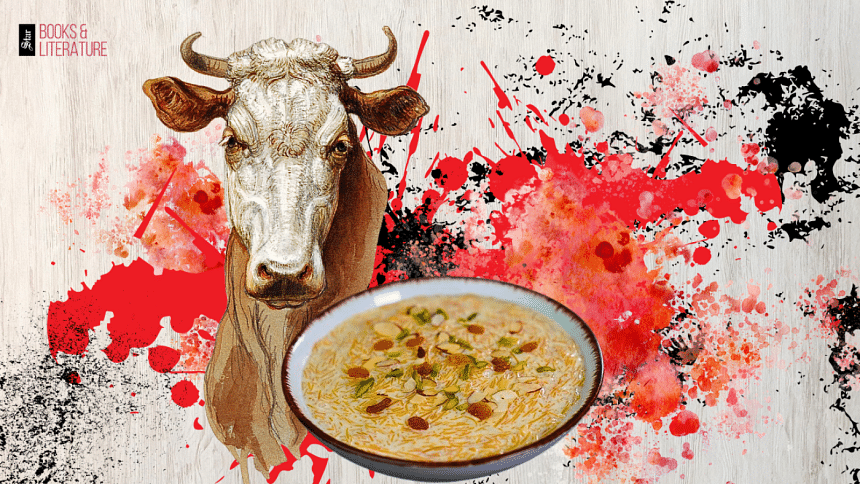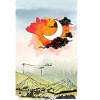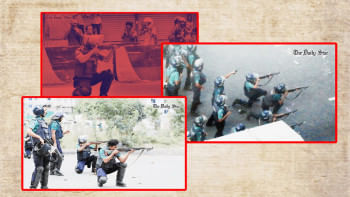A sacrifice

Months after her wedding, Moymun visits her parents during the Eid holidays. Her heart has constantly ached for this return. Her brother Kalam visited her every Friday. Once, he was a day late and Moymun was so upset she did not speak to him for a while.
Her mother's health has worsened. These days she does bits and pieces of household chores, but often just sits in silence. If someone calls her, she just stares—an unreadable, distant gaze.
The afternoon before Eid, Moymun thinks of making shemai with her mother.
As soon as Kalam returns home, Moymun runs to him with the milk pot.
"It's empty! You didn't bring any?" She asks.
"Should I just magically make milk appear?"
Kalam never talks to her like this.
"We never needed to buy any. Even in our own house, we could've had at least two seers of milk. But we had to sell Dholi for your wedding!"
Kalam's face flushes with anger. Dholi had been their milking cow.
Monir from Dakshinpara now has Dholi. When he was handing over the money to Naimuddin, their father, Kalam silently cried, holding Dholi's neck in the yard. And when Monir came closer, Kalam stroked Dholi's head, and with a choked voice said, "Go, Dholi. Be well. I'll come visit you."
Then he ran into the house and fell on the bed sobbing.
Moymun's in-laws are well off. They slaughtered two large bulls during the wedding. Naimuddin also slaughtered two cows.
If both families do not maintain parity, the girl often has to endure taunts and reproaches from her in-laws' house, Naimuddin believed.
Kalam's words pierce Moymun.
She thinks maybe it would have been better if the wedding hadn't happened.
That night, she doesn't eat dinner.
Later, her father comes by and sits with her for a while. Naimuddin never says much. That night, he too doesn't eat.
Kalam walks straight to the cowshed. There, both Bhoma and Bhola are lain down. They have no worries, no sorrow. If Bhola really had burdens in life, could he chew cud so peacefully? Bhoma, however, stands up as soon as she sees Kalam. She seems happy to see him at this unusual hour, and expresses it by wagging her shiny mustard-oiled horns and tail.
"You tell me, Bhoma," Kalam asks the cow, "Did I say anything wrong? And just for that, she's so angry? Didn't even eat dinner! Well, let her be angry. I'm angry too."
The thought of Kalam going to bed hungry makes Moymun feel worse.
It's a hot night. He doesn't even drink water. Both siblings lay in bed awake till late.
In the morning, Naimuddin and Kalam bathe and dress in their Eid clothes.
Their mother serves them puffed rice and molasses.
Moymun doesn't speak a word the entire morning. She slips out to Rustam's house.
"Auntie, didn't Rustam bhai milk the cow at dawn? Kalam couldn't get any at the market yesterday."
She pours some milk into a bowl and hands it to Moymun.
When Moymun asks how much she owes, Rustam's mother scolds gently, "You're the daughter-in-law of the Sorkar house, and you think of us as strangers, Moymun? For a bit of milk to make Eid shemai, you think I'd take money from you?"
Back home, she carefully starts cooking the shemai. Her mother stands and watches silently.
After the shemai is done, Moymun bathes her mother, dresses her in a Kalka-printed sari. She, too, puts on a parrot-colored one she received from her in-laws, pats some cosmetics on her face, some earrings, and glass-bangles.
Her mother gazes at her for a long time, sees her wash and ready the plates and glasses.
But when Naimuddin returns from the Eidgah, he doesn't look around or say anything.
He simply rolls a tobacco leaf and sits on the cot. Then he begins to smoke quietly. He takes short puffs, thin streams of smoke crawl out. Never a satisfying puff.
Offering a plate of shemai, Moymun says, "Bapjan, have some semai. Kalam still hasn't come back."
She hopes her father will be surprised, happy even, and ask, "Where did you find milk, my girl?"
But Naimuddin says nothing. He doesn't even touch the shemai. Just glances at it once, then turns away and goes back to smoking his hookah.
Moymun doesn't speak again. Her heart fills with hurt and resentment.
That day, five cows, one buffalo, and seven goats are being sacrificed in the village. The street runs past the outer yard. Right after prayers, people scurry house to house. Everyone is busy, eager to have their animal sacrificed first.
Naimuddin notices all this with his hookah.
From all the shouting, it sounds like Majid's bull is being slaughtered. It must've been a fierce one. Surely it couldn't be pinned down with just one rope. At least six or seven people must've used a bamboo pole across its belly to restrain it.
Last year, Naimuddin was busy too. He had sacrificed the family bull. It may have been old, but it was plump and healthy. The meat had been bright red, of excellent quality. He remembers the sermon the Imam gave: "Allah accepts the qurbani of the servant who sacrifices his most beautiful and valuable animal."
*
"Jyada, hey Jyada! The house is so quiet today! What are you doing indoors on Eid day, Jyada?" says Kashem Ali, entering Naimuddin's room.
He pulls up a low stool and sits. "Let me try a puff, then. Hand me the hookah."
Taking a few drags, Kashem Ali says, "You married Moymun off, and this is the first time you didn't offer qurbani? That's not right, Jyada. What will your new relatives think? That your in-laws will do your qurbani for you?"
"Had enough to eat? Hand over the hookah!"
Kashem Ali doesn't say more and leaves.
Kalam returns with Bhoma and Bhola and comes to the well. He ties the cows to the edge of the well and draws the water, filling their trough.
Moymun walks over to Kalam. Her eyes well up with tears. Kalam looks at her. The rope of the cow slips from his hand. He lowers his head and begins to sob like a little boy. Moymun takes his head to her chest and breaks down in tears herself.
"What sense do you have at all! People are coming back from prayer, and you're here with the cow. That cow is everything to you, isn't it?"
Kalam stays silent for a moment. Then he looks at Moymun and says, "Are you angry with me?"
"Yes," Moymun says, "Come, have some shemai."
"Shemai? Where did you get the milk?"
"First, go tie up Bhola and Bhoma. Bapjan is sulking. We'll eat with him. Can you manage that?"
Kalam goes to his father.
"Bapjan, put down the hookah, let's have some shemai first. Come." Kalam practically snatches the pipe from his father's hand. Naimuddin doesn't protest. He gets up.
At that moment, a strong young man wearing a lungi and vest, with a towel tied around his waist, enters the courtyard carrying a large covered bowl on his shoulder. With some difficulty, he places it on the ground and removes the banana leaf covering it.
The bowl is full of large chunks of meat.
"Bhabi, bhabi, here's the meat!" shouts Fazlu, the servant boy from Moymun's in-laws' house.
Moymun stands with a heavy face.
"Look," Kalam says, "Look how much they had sent!"
Moymun wonders, "How can I send back the empty bowl after keeping all this meat? What will people from that house think, what will they say? How will I face them again?"
"What's wrong with all of you? Why is no one moving?" Kalam, irritated, brings two pots from the kitchen and starts transferring the meat onto them. His arms become stained red to the wrists. When the meat is transferred, a pool of blood is left in the bowl. Fazlu tilts it and pours out the blood. A large section of the courtyard turns bright red.
"I'm off, bhabi, lots of work at home."
Even in front of the servant boy from her in-laws, Moymun lowers her head in shame. She couldn't even ask him to stay for shemai.
Fazlu is about to leave with the empty bowl when an old man, Joynal, enters the courtyard, chewing betel. Seeing the blood-stained bowl, he asks, "Hey Naimuddin, is that from your in-laws? So much!"
He asks the boy, "How many cows did you sacrifice?"
"Two," he says and leaves.
"Naimuddin, what have you done? They returned with an empty bowl from your in-laws."
"Joynal Chacha, get out—get out right now!" Naimuddin yells. His hands and feet tremble with rage.
Old Joynal doesn't argue any further out of fear. "You humiliated me on Eid day, Naimuddin? May God judge you for this!" He mutters as he leaves.
Naimuddin stands still. He finds the big knife kept behind the fence and brings a grinding stone from the kitchen and sits down to sharpen it.
Kalam asks, "What are you doing? Come now. Let's eat together."
Naimuddin continues sharpening the knife, says, "Go call the imam."
"Why, Bapjan? Why the imam?"
"Just do as I say... We'll make a sacrifice too. Bhoma is the strongest, right? That one we'll give. Go."
"No, Bapjan, no!" Kalam screams.
"You won't go? Then I'll go myself."
"Give me that knife!" Kalam runs and grabs the hilt of the knife. "Give it to me, Bapjan, give it to me!"
"Move, Kalam," Naimuddin says, gripping the knife hard.
"Ma!" Moymun clings to her mother.
"Let go of the knife, I said! Kalam!" Naimuddin's eyes burn with fury.
"No—no—no—no!" Kalam doesn't let go. He desperately tries to pull the knife from Naimuddin's hands. A tug-of-war. A struggle. Screams. In the chaos, the freshly sharpened knife slips from Naimuddin's hand and plunges into Kalam's stomach.
Kalam falls to the ground. The rest of the courtyard is flooded. Red.
Moymun's lips tremble harder. "Kalam!" she screams. "Oh God, what have you done!" She clutches the bleeding Kalam and collapses in despair.
Translated from Bangla by Shahriar Shaams
M Shamsul Hoque is an educator and writer, having worked as Dean at Bangladesh Open University and a senior ELT Specialist at BRAC. He has also served as a textbook writer for NCTB. He can be reached at [email protected].
Shahriar Shaams has written for SUSPECT, Third Lane Mag (forthcoming), Commonwealth Writers' Adda, Six Seasons Review, and Jamini. Find him on twitter @shahriarshaams.

 For all latest news, follow The Daily Star's Google News channel.
For all latest news, follow The Daily Star's Google News channel. 










Comments